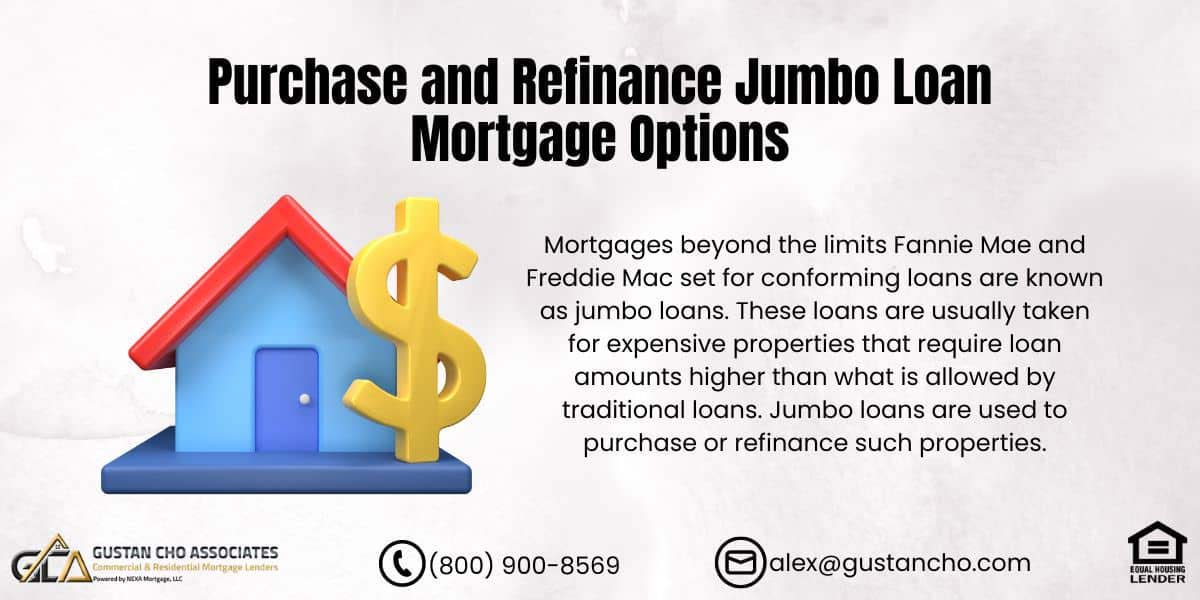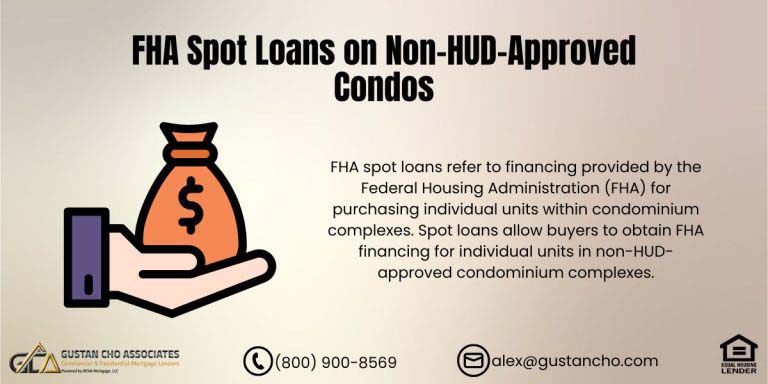This guide covers home purchase and refinance Jumbo loan mortgage loan options. There are traditional and non-qm jumbo loans for owner-occupant homes, second homes, and investment homes. Many self-employed homebuyers of higher-end homes can afford a high-balalnce jumbo mortgage loan, however, do not qualify due to the hefty write off on their income tax returns.
High-end homebuyers may not qualify for traditional jumbo loans but may be eligible for no-income documentation non-QM loans for self-employed borrowers. In the following paragraphs, we will cover and discuss home purchase and refinance jumbo loan mortgage options. We will cover traditional and non-QM mortgage options for home purchase and refinance transactions.
Refinance Jumbo Loan From Non-QM to Traditional Jumbo Mortgage
There are different types of refinance jumbo loan programs. Why consider refinance jumbo loan? There are many reasons for homeowners to refinance their current jumbo loan.
It can be because they currently purchased a home out of via land contract and need to pay the home seller who is holding the land contract.
It can be due to buying the home with a high interest rate non-QM loan and need to refinance to a traditional full-doc jumbo loan. Home prices have skyrocketed in the past several years. Most homeowners have homes with a lot of equity due to home appreciation. These homeowners may want a cash-out refinance jumbo loan. People going through a divorce may want to refinance to get their spouse off the mortgage and deed.
Looking to Refinance or Buy a High-Value Property? Get the Best Deal with Our Jumbo Loan Options!
Contact us now to learn more about how we can help you secure the best terms for your high-value home purchase or refinance.
Jumbo Non-QM Loans For Self-Employed Borrowers
Non-QM loans and bank statement mortgage loans for self-employed borrowers are back. Traditionally, Jumbo loans are much tougher to qualify for than standard Conventional Loans. Jumbo loans for self employed borrowers with credit scores down to 500 FICO is now available to qualified borrowers at Gustan Cho Associates.
The minimum down payment required on jumbo loans for self-employed borrowers depends on credit scores. With bank statement loans for self-employed borrowers, lenders will average 12 months of deposits from their bank statement.
How Is Income Calculated on Jumbo Bank Statement Loans For Self-Employed Borrowers
The 12 month average of deposits is used as monthly gross income. Withdrawals from bank statements do not count. Gustan Cho Associates also offers bank statement loans for self-employed borrowers with no waiting period after bankruptcy or foreclosure. There is no private mortgage insurance required on all Non-QM loans. The maximum loan limit is up to $5 million. Jumbo non-QM loans is available for purchase and refinance transactions.
How Lenders Qualify Self-Employed Borrowers
Two years of tax returns for mortgage qualification are not required with our 12-month bank statement mortgage program for self-employed borrowers. 12 months of the mortgage loan borrowers’ bank statement deposits are averaged. The average of the past 12 months’ deposits is used as the monthly qualified income of the borrower.
With traditional home loans, lenders rely on the W-2s from the past two years plus borrowers’ current paycheck stubs in determining monthly gross income when qualifying for traditional mortgage loans. Jumbo bank statement loans have loan limits up to $5 million. It is available for both home purchase and refinance mortgages.
How Qualified Income Is Determined on Jumbo Bank Statement Mortgage Loans
With self-employed borrowers, lenders will need to rely on the borrower’s monthly income from bank statement deposit averages. Withdrawals do not count and is not taken into consideration. For example, if a borrower were to deposit $10,000 every month and withdraw $9,999 the next day, only the $10,000 monthly deposit will be used.
The maximum debt-to-income ratio caps on non-QM loans is capped at 50% DTI. If a borrower may not meet a certain lending guideline of the non-QM wholesale investor, the investor can make exceptions if the deal makes sense.
Most self-employed borrowers had issues with qualifying for a home mortgage due to income qualification due to write-offs on tax returns prior to the launching of the 12-month bank statement mortgage program. Now, the borrower’s income tax returns do not matter. Only bank statement deposits matter.
Tax Returns of Self Employed Borrowers
The way mortgage lenders determine income for those who do not have W-2s and are self-employed is by averaging the adjusted gross income from the past two years of income tax returns. Depreciation can be added back in as additional income. If the adjusted income for the past two years is the same or the most recent year adjusted gross income is increasing, then the two years’ tax returns adjusted gross income is averaged.
If the most current year adjusted income from tax returns is significantly less, then the lender will just use the lower adjusted gross income and average that by 12 months or one year. This income calculation for self-employed borrowers became a common issue. Bank statement mortgage loans for self-employed borrowers can make qualifying for a Jumbo loan possible without income tax returns.
Need a Jumbo Loan for Your Home Purchase or Refinance? We’ve Got the Right Options for You!
Contact us today to learn about our competitive rates and flexible terms to secure the perfect mortgage for your luxury property.
Underwriters Average Two Years Tax Returns For Mortgage Qualification
What happens if the borrower needs higher income and needs to file the 2019 tax returns that have currently had a tax extension? Borrowers can file tax returns for 2019 which has an extension. Borrowers can use the average of the 2018 and 2019 tax returns for mortgage qualification. But lender needs to verify that the tax returns have been filed via IRS form 4056.
It normally takes 6 to 8 weeks to be able to verify that from the IRS. If you are in this situation, contact us at 1-800-900-8569 or text us for a faster response. Or email us at gcho@gustancho.com.
Depending on the lender, a CPA letter can be sufficient or borrowers may have to go to local or regional IRS office and get tax returns stamped by an IRS official. Lenders might also require to provide a copy of the canceled check that was submitted with 2019 IRS tax returns. However, if you are applying for the 12-month bank statement mortgage loan program, no income tax returns are required.
Amending Tax Returns For Mortgage Qualification
What happens if I amend my tax returns for mortgage qualification? This is common practice with many self-employed and business owners who have declared very little income and want to amend their tax returns for mortgage qualification. Anyone can amend their income for mortgage qualification but needs to be legitimate. Borrowers who want to write less off and get advice from CPA.
Taxpayers can declare more income on tax returns for mortgage qualification. Taxpayers can do that and pay more taxes. However, there is a six-month waiting period after a tax return has been recently amended for a lender to take tax returns for mortgage qualification.
Can I Amend Income Tax Returns After Closing on My Mortgage?
What if I amend my tax returns after I get the mortgage? Taxpayers who amend tax returns after they have closed on home loans to reflect less income, there could be red flags raised. Taxpayers who solely amended tax returns for the purpose of just obtaining a mortgage loan could possibly be considered mortgage fraud if not done the right way. Seek the advice of a tax attorney or CPA.
However, if it was due to an honest mistake that can be documented and was legal then there should not be a problem. I am not an accountant nor a tax attorney so I recommend you seek the advice of a tax professional. I do want to warn folks that it is not worth amending tax returns for mortgage qualification if the figures are not correct and are planning on re-amending them again after closing the mortgage loan.
Related> Borrowers who are Self Employed
Minimum Down Payment on Jumbo Loans on Home Purchases
Jumbo mortgages are called non-conforming mortgages. This is because they do not conform to Fannie Mae and Freddie Mac conforming guidelines on maximum loan limits. Jumbo loans are mortgages that are larger than $647,200 loan limits. Lenders normally require a 20% down payment or more on traditional Jumbo loans.
However, Gustan Cho Associates just launched a 10% down payment Jumbo Loans With No Mortgage Insurance Required. We will cover buying or refinancing jumbo loan programs with special emphasis on traditional and non-QM jumbo mortgages with a 10% down payment on this blog.
Traditional Down Payment Jumbo Loans Versus NON-QM Jumbo Mortgages
Jumbo loans have tougher mortgage underwriting criteria than conventional and FHA loans. Most lenders require a maximum debt to income ratio no greater than 40%. Lenders can set their own mortgage lending standards on a down payment on jumbo loans. To get the best possible rate on a Jumbo loan, borrowers would want to put as much down payment as possible and have the best credit scores.
There are Jumbo mortgage loan programs with lenient mortgage underwriting guidelines. There are Jumbo Loan programs that only require a 10% down payment with no private mortgage insurance to qualified borrowers. However, a 10% down payment home purchase or a 90% LTV refinance mortgage jumbo refinance loan requires a 720 credit score.
10% Down Payment Jumbo Loans
10% down payment Jumbo loans on home purchases for qualified borrowers. There are certain criteria that are required borrowers must meet. The maximum size for the 10% down payment Jumbo loans is that the mortgage loan borrower needs 10% down. Borrowers must have a maximum debt to income ratio of 40% back end.
For a slightly higher interest rate, the 10% down payment Jumbo loans program has a special program where no private mortgage insurance is required. It is called LPMI, which stands for Lender Paid Mortgage Insurance.
The 10% minimum down payment jumbo loans program is becoming increasingly popular. Gives qualified home buyers with limited down payment sources an opportunity to purchase higher-end homes. The maximum loan size on a 10% down payment jumbo loans program is capped to a loan size of $5,000,000.
Ready to Secure a Jumbo Loan? Get the Best Rates for Your Luxury Home Purchase or Refinance!
Reach out now to explore our jumbo loan options and get pre-approved for your next home purchase or refinance.
Guidelines on 10% Down Payment Jumbo Loans
For those who want to purchase up $5,000,000 residential homes and want to put as little money down as possible, we offer the 10% minimum down payment on the jumbo loans mortgage program. 10% down Jumbo Loan program, the borrower needs a minimum of a 720 Credit Score. The maximum debt to income ratio is 40% back end. The maximum loan size is capped at $5,000,000. 10% down payment on jumbo loan mortgage program does not require private mortgage insurance.
We offer adjustable-rate mortgage and 30 year fixed rate jumbo loans with no pre-payment penalty fees. For more information on Jumbo Loans, please contact Gustan Cho Associates at 800-900-8569 or text for a faster response. Or email us at gcho@gustancho.com. We are available 7 days a week, evenings, weekends, and holidays.
- Related> Jumbo Mortgages
- Related> Jumbo Loans With 10% Down Payment
- Related> Amending Tax Returns to Qualify for Mortgage
FAQ About Purchase and Refinance Jumbo Loan Mortgage Options
- 1. What are jumbo loans? Mortgages surpassing the limits Fannie Mae and Freddie Mac set for conforming loans are known as jumbo loans. These loans are usually taken for expensive properties that require loan amounts higher than what is allowed by traditional loans. Jumbo loans are used to purchase or refinance such properties.
- 2. What are the key differences between traditional and non-QM jumbo loans? Traditional jumbo loans typically require full documentation of income and credit history and adhere to strict underwriting criteria. Non-QM (Non-Qualified Mortgage) jumbo loans, on the other hand, offer more flexible options, such as bank statement loans for self-employed borrowers, which do not require traditional income verification.
- 3. Why might someone refinance from a non-QM to a traditional jumbo mortgage? Homeowners may refinance from a non-QM to a traditional jumbo loan to secure a lower interest rate, reduce monthly payments, consolidate debt, or switch from an interest-only to a principal and interest loan. This can also benefit those who initially could not meet strict traditional lending criteria but whose financial situations have since improved.
- 4. How do non-QM jumbo loans work for self-employed borrowers? Non-QM jumbo loans for self-employed borrowers typically use alternative income verification methods. One common method is bank statement loans, where lenders calculate income based on the average deposits over a 12-month period rather than relying on W-2s or traditional income documentation.
- 5. What are the typical down payment requirements for jumbo loans? Traditional jumbo loans often require a down payment of 20% or more. However, some specialized programs, such as those offered by Gustan Cho Associates, may allow down payments as low as 10% without requiring private mortgage insurance (PMI).
- 6. What is a bank statement loan? A non-QM loan, called a bank statement loan, permits borrowers to utilize their bank deposits as evidence of income instead of traditional documents such as pay stubs or tax returns. This loan type can prove advantageous for those who work for themselves or have unsteady earnings.
- 7. Do jumbo loans have any particular credit score requirements? For traditional jumbo loans, borrowers typically need a credit score of 720 or higher. However, non-QM loans may have more flexible credit requirements, potentially going as low as 500 FICO for certain products offered by lenders like Gustan Cho Associates.
- 8. Can I use a jumbo loan for an investment property or second home? Jumbo loans are applicable for primary residences, second homes, and investment properties, subject to the lender’s terms and availability and the specific loan product, whether you are purchasing or refinancing.
- 9. What happens if I must amend my tax returns during the mortgage process? Tax returns can be amended for legitimate reasons, such as declaring additional income or correcting errors. However, if done shortly before applying for a mortgage, there might be a mandatory waiting period (usually six months) before lenders will consider the amended returns for income verification purposes.
- 10. How can I qualify for a jumbo loan if I am self-employed? Self-employed individuals can qualify for jumbo loans using non-QM options such as bank statement loans. These require the borrower to provide 12 months of bank statements to show consistent deposit income, which will be used to assess their ability to repay the loan.
If you need more detailed information or have specific inquiries about jumbo loans and their requirements, seek the assistance of a mortgage specialist or financial consultant who can provide tailored advice based on your financial situation.
Looking to Buy or Refinance a High-Value Property? Explore Your Jumbo Loan Options Today!
Contact us today to discuss how our jumbo loan options can help you achieve your homeownership goals.










